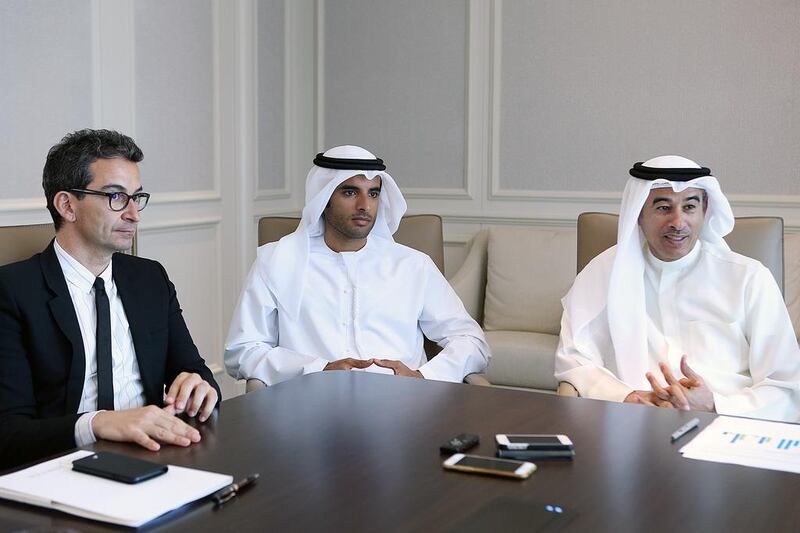The joint venture between Yoox Net-A-Porter and Mohamed Alabbar to bring its online luxury platform to the region will begin operations next year, with its full range of products expected in early 2019, according to Yoox Net-a-Porter Group’s chief executive, Federico Marchetti.
Both executives spoke in an exclusive interview with The National on Tuesday and confirmed that the joint venture, which was announced last November by Mr Alabbar, was "perfectly on track" with its roll-out plan.
“Our plan was to open a warehouse and offices by the end of this year, 2017, with a local team that we are in the process of recruiting. We have already identified the key people,” said Mr Marchetti.
“At the beginning of next year, we are going to launch two of our brands, which is Yoox and The Outnet, which is the off-season division, with a gradual approach to localisation.
“And then a year later, if not sooner, we are going to launch Net-a-Porter and Mr Porter, which is the in-season division.”
Revenues at Yoox Net-A-Porter grew 17.7 per cent last year to €1.9 billion (Dh7.6bn) with about €1bn coming from mobile, according to Mr Marchetti. The company earns about 52 per cent of revenue from its in-season division. Full-year adjusted Ebitda was €156 million, up 17 per cent.
Mr Marchetti said the decision to launch locally through a joint venture with Symphony Investments, a company owned by Mr Alabbar’s family and chaired by him, offered the advantage of local retail expertise.
For instance, a decision taken by Net-A-Porter to begin offering watch and jewellery categories came from an idea provided by Mr Alabbar.
Mr Marchetti explained: “It was one year ago when he told me ‘given that you have such an important and wealthy customer – 3 million customers around the globe – they are spending over U$100,000 and so on every year, why don’t you give them also watches?’”
Net-A-Porter began selling watches in November last year, offering timepieces by the Swiss watch manufacturer IWC Schaffhausen and the Italian jewellery company Pomellato. Two weeks ago, it also began offering Cartier watches online.
“This comes from knowing the customer,” Mr Marchetti said. “And we think that this category in the region will be even more successful than in the rest of the world.”
Mr Alabbar owns 40 per cent of the $100 million-plus joint venture as well as a 4 per cent stake in Yoox Net-A-Porter itself. The Swiss luxury goods group Richemont, the owner of the Cartier and Dunhill brands, is Yoox Net-A-Porter’s largest shareholder.
The region is already one of the Net-A-Porter brand’s fastest-growing markets and this is expected to continue throughout the set up and launch process up to 2019.
“The timing, 2018-19, is also because we wanted to … once we launch fully local, we want it to be perfect,” said Mr Marchetti.
Mr Alabbar, who is also the Emaar Properties chairman, would not disclose any details about his other e-commerce venture said to be in the works, Noon.com, but both he and Mr Marchetti said in terms of online luxury that Yoox Net-A-Porter would be the only focus.
Amazon’s acquisition of Souq.com in March has been seen as a watershed moment for e-commerce in the region and the fledgling online retail market is now expected to grow more quickly.
Rohit Majhi, a senior manager from Monitor Deloitte, said the large family-owned retail companies, which generally hold the rights for major fashion brands in the UAE, are now building up a direct online presence.
“Almost every single top-tier and mid-tier holding company is now trying to figure out how to put their brands on an e-commerce platform. They’ve realised that they need to do that to keep the brands in their portfolio,” he said.
Mr Majhi said many firms were setting ambitious targets of generating up to 20 per cent of sales online within a couple of years, despite the fact that in some cases they need to build from scratch.
Retailers have realised they are facing a generational shift in terms of consumers, with younger buyers in the UAE simply ordering goods from overseas portals. Mr Majhi said about 54 per cent of online transactions in the UAE are goods ordered from foreign portals.
mfahy@thenational.ae
malrawi@thenational.ae
Follow The National's Business section on Twitter





